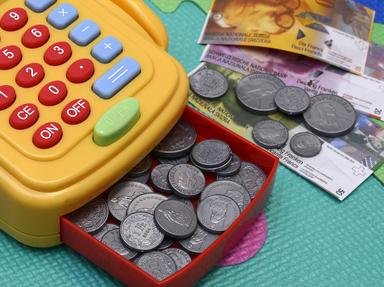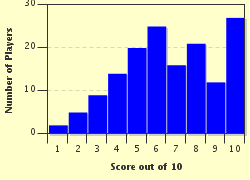Quiz Answer Key and Fun Facts
1. As the introduction suggests, there is a game in which one unlucky child will find themselves revealing that they just ate a horse. What is the first line of this playground game?
2. Today I see a line of children walking between two players who are holding each other's hands and forming an arch. All of a sudden, they drop their arms and trap a child! What famous bridge were they almost certainly singing about during this game?
3. Jumping rhymes are universal in feel, but quite varied in local detail (which all the current players know exactly, and will remember 50 years later). One rhyme that we used to chant (in Massachusetts in the 1960s) while swinging the rope back and forth along the ground for the jumper to hop over was "Blue bells, cockle shells, Eevy, ivy, over". What happened after the last word of this chant?
4. In the game of Elastics, two players stand with a large loop of elastic stretched (only slightly) around their ankles, feet apart at shoulder width. The active player then performs a series of steps according to an agreed routine, while onlookers chant the appropriate words. One such routine uses the chant "Inside, Outside, Left side, Right side, Inside, On". What does the active player do when the word "On" is called?
5. The game of conkers, played most extensively in the British Isles, does not involve any chant while playing, but it is a common superstition that your conkers will be more likely to conquer if you say (something like) which of the following when you find the first horse chestnut seed of the season?
6. Some songs are accompanied by hand movements, which replace the words as the song is repeated. What is the name of the dog whose name is spelled out in the first verse of one such game, with one letter at a time being replaced by a handclap in each subsequent verse?
7. When a group of kids have to walk a long way, someone is likely to suggest a marching chant to keep their minds off the tedium. Which of the following is a typical starting line for such a chant?
8. Clapping games usually involve a complex series of hand movements to be completed, but sometimes the clapping is simply a background to force players to improvise their answers in a timely fashion. One such game is "A my name is Alice", in which each player has to complete a series of four statements for their turn. Which of the following lines could NOT be part of the turn that starts "A my name is Alice"?
9. There are lots of counting-out games, which we used to use to decide who would be 'It' at the start of a game for which that was necessary. What vegetable is associated with the counting-out game in which players hold their fists in the centre of the circle, and the counter hits each fist in turn around the circle?
10. This one is not exactly a chant, and not a playground game, but a good car game which brings us back to the horses with which we started. You need to be in a rural area or the kids will give up really fast. When you spot a horse, you score a point. What do you need to be driving past for one player to be able to tell the others to 'Bury Your Horses'?
Source: Author
looney_tunes
This quiz was reviewed by FunTrivia editor
WesleyCrusher before going online.
Any errors found in FunTrivia content are routinely corrected through our feedback system.

